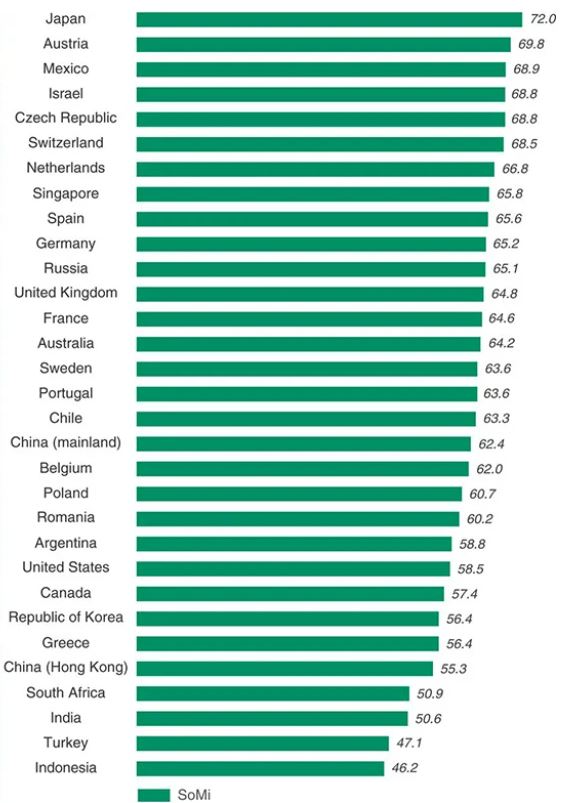Social Mindfulness and Country
Whether or not we show compassion to “strangers who are not our friends or acquaintances” may depend not only on our personalities and beliefs, but also on our culture. A new international team of researchers from 31 countries has published the results of a study on the tendency to be compassionate toward strangers in “8354 subjects living in 31 countries.
Social mindfulness and prosociality vary across the globe | PNAS
https://www.pnas.org/content/118/35/e2023846118
Social mindfulness varies across the globe – Leiden University
https://www.universiteitleiden.nl/en/news/2021/08/social-behaviour-niels-van-doesum
Not All Cultures Are Equally Mindful of Strangers – Here’s How Your Country Ranks
https://www.sciencealert.com/not-all-cultures-are-equally-mindful-of-strangers-here-s-how-your-country-ranks
In recent years, there has been an emphasis on “mindfulness,” paying attention to what you are experiencing in the present. In contrast, paying attention to the situations and intentions of others is called “social mindfulness. People who have strong social mindfulness tend to think about how their choices affect others and change their behavior according to “what others might want”.
An international research team of a total of 64 researchers from 31 countries conducted an experiment to determine the degree of social mindfulness in subjects living in their respective countries. In the experiment, the subjects were asked to “choose one red apple and one green apple from a bowl containing two red apples and take it with them. The subjects were presented with a hypothetical situation in which they were asked to choose which apple or other object they would take.
If the subject took the green apple, the next person could choose between “one red apple and one green apple”, but if the subject took the red apple, the next person would have no choice but to take one of the two green apples. In this situation, the subject who leaves the choice to the next person by choosing the blue apple is considered to have “social mindfulness. The research team measured the social mindfulness of the subjects by presenting the same situation multiple times with different numbers of apples and other objects.
The subjects of this experiment were mainly students between the ages of 18 and 25, and they received a total of 8354 valid responses from 31 countries. The breakdown of participating countries was as follows: U.S., Canada, Mexico, Chile, Argentina, U.K., Sweden, France, Switzerland, the Netherlands, Germany, Spain, Portugal, Belgium, Poland, Austria, Czech Republic, Romania, Greece, Russia, Japan, South Korea, China, Hong Kong, Singapore, India, Indonesia, Turkey, and South Africa. India, Indonesia, Turkey, South Africa, Australia, and Israel.
The results of the experiment are as follows. The “SoMi” (green bar) indicates the degree of social mindfulness.

The countries with the highest degree of social mindfulness are, in order from first to last, Japan, Austria, Mexico, Israel, Czech Republic, Switzerland, Netherlands, and Singapore. ……
The countries with the lowest levels of social mindfulness are the United States, Canada, South Korea, Greece, Hong Kong, South Africa, India, Turkey, and Indonesia. The lead author of the paper, Niels van Doesum, a psychologist at Leiden University in the Netherlands, said, “We don’t attach any value criteria to our findings. The important thing is that there is a difference. That’s what we were hoping for, but it hasn’t been scientifically proven,” he said. He said that the results were only an indication of cultural differences, and not an indication of superiority or inferiority, such as “countries with higher levels of social mindfulness are better.
The experiment involved little material cost, and the social mindfulness measured involved “little attention or kindness. In their paper, the researchers state that “cooperation with others at low cost is a fairly common phenomenon, but it has received little empirical attention,” and that it needs to be studied separately from situations involving money or large amounts of effort.
It is believed that differences in social mindfulness are influenced by “trust in others,” “level of education,” “economic status,” and “religious values,” but more research is needed to understand this point. The research team believes that research such as social mindfulness is important to deepen our understanding of how people treat others and to consider issues such as immigration and diplomacy.